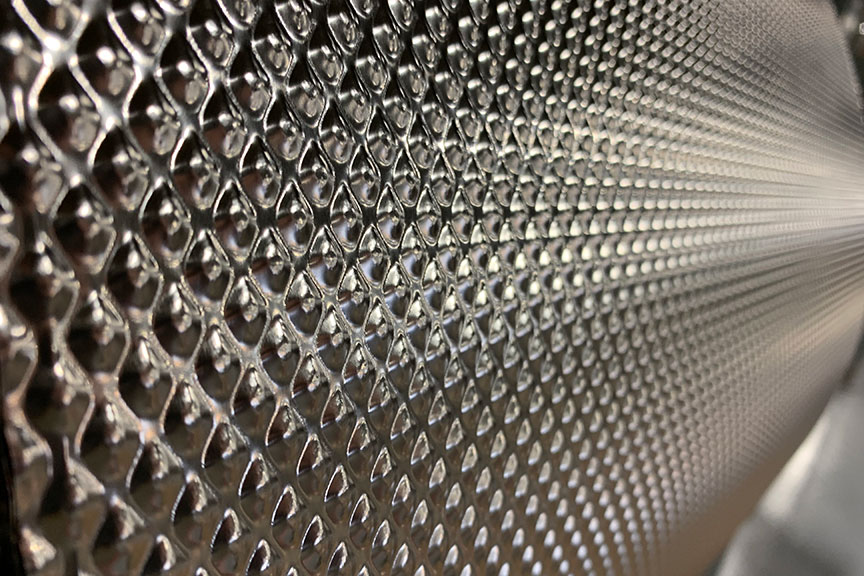STAINLESS STEEL FOIL ALLOY 304
These alloys are the most common and economical stainless alloys on the market. They are non-heat treatable alloys, which makes them perfect for tool wrap applications when heat treating parts. It is extremely resistant to corrosion, and heat oxidation, for applications up to approximately 2000 degrees Fahrenheit. They are non-magnetic in the annealed condition. At times in the foil thicknesses, the individual production lots can be certified to 302, 304 and 304L standards.
The drawback to strictly 302 alloy, is that in extreme conditions, carbide precipitation can occur. Type 304 alloy alleviates this problem by decreasing the carbon content and thereby eliminating the possibility of intergranular corrosion. This low carbon alloy is most often utilized for application requiring welding. An Extra Low Carbon Alloy, 304L, is also available for severe welding applications. All the alloys are popular in food and dairy industries and for pharmaceutical equipment. It is useful in applications where good mechanical properties and corrosion resistance are essential. These alloys are used in our tool wrap rolls for companies’ heat treating parts.
Standard Specifications: AMS A240, UNS S30400
Comet Metals welcomes any opportunity in Stainless Steel Foil, Stainless Steel Coil or sheet products that you may require. Call us at 888-539-5602 today for a quote and learn for yourself how Comet Metals can assist you in your converter projects. The specifications shown on these pages are not for design purposes.
![]()
| AMS Spec Number: | 5513 |
|---|---|
| Annealing: | 1850-2050 Fahrenheit, followed by rapid cooling is necessary |
| Applications: | The list is far and wide. Every conceivable industry uses some of this material in some way. Everything from treating parts, metal tapes, kitchen appliances, and machine parts, it can be shaped, cut and applied in numerous applications. Just watch out for the sharp edges. |
| ASTM Standards: | A666 |
| Finish: | Standard Finishes |
| Forging - Hot Working: | Forging, heading and other hot working should follow uniform heating to 2100-2300 °F (1149-1260 °C).Rapid cooling is required to attain a max corrosion resistance in finished parts. Readily fabricated by most cold working methods, 304 may require intermediate annealing to avoid cracking or tearing along edge of product. Full annealing should follow afterwards. |
| Hardening: | This alloy does not respond to heat treatment, hence the primary use of this product being to hear treat parts within the shell of a sheet of 304. Cold work will cause an increase in both hardness and strength. |
| Principal Design Features: | This is the most widely used and readily available alloys on the market.Originally certified as 18-8, which referenced its nickel and chromium content, it’s attributes include excellent strength, corrosion resistance and Temperature resistance. It is available in many forms of parts, sheets, and coils. |
| Temper: | MOST Tempers |
| Thickness: | 0.001 to 0.032 in |
| Welding: | All fusion and resistance procedures have been successfully used in welding 304. AWS E/ER308 or 312 filler metal is recommended for use. For stronger welds, many users choose 304L which contains a lower carbon content designed to reduce precipitation |
| Width: | 0.375 to 36 in |
| Carbon (C): | 0.08% |
|---|---|
| Chromium (Cr): | 19% |
| Manganese (Mn): | 2% (Max) |
| Molybdenum (Mo): | - |
| Nickel (Ni): | 9.25% |
| Nitrogen (N): | 0.10% (Max) |
| Other Total: | 0.10% (Max) |
| Coefficient of Thermal Expansion: * | 9.6 Inches/inch/°F x 106 |
|---|---|
| Density:** | 0.287 lbs./cu.in. |
| Electrical Conductivity: *** | 432 % IACS |
| Elongation (1/2 Hard): | 6 (Min) |
| Elongation (1/4 Hard): | 10 (Min) |
| Elongation (3/4 Hard): | 3 (Min) |
| Elongation (Annealed):+ | 40 (Min) |
| Elongation (Full Hard): | 1 (Min) |
| Elongation (Spring): | 1 (Nom) |
| Modulus Of Elasticity: ++ | 28 x 106 psi |
| Rockwell (1/2 Hard): | B92 |
| Rockwell (1/4 Hard): | B92 |
| Rockwell (Annealed): +++ | B92 |
| Tensile Strength (1/2 Hard): | 150 to 175 x 1000 psi |
| Tensile Strength (1/4 Hard): | 125 to 150 x 1000 psi |
| Tensile Strength (3/4 Hard): | 175 to 200 x 1000 psi |
| Tensile Strength (Annealed): ^ | 75 to 100 x 1000 psi |
| Tensile Strength (Full Hard): | 185 (Min) x 1000 psi |
| Tensile Strength (Spring): | 200 (Min) x 1000 psi |
| Thermal Conductivity: ^^ | 9.4 BTU per sq.ft.per hr. per °F |
| Yield Strength (1/2 Hard): | 110 (Min) x 1000 psi |
| Yield Strength (1/4 Hard): | 75 (Min) x 1000 psi |
| Yield Strength (3/4 Hard): | 135 (Min) x 1000 psi |
| Yield Strength (Annealed): ^^^ | 30 (Min) x 1000 psi |
| Yield Strength (Full Hard): | 140 (Min) x 1000 psi |
| * Inches/inch/°F x 106 from 68°F to 572°F (20°C to 300°C) ** Lbs.per cu.in. at 68°F (Annealed) ( x 27.68 gms./cu.Cm. at 20°C) ** % IACS at 68°F (20°C) as annealed + % in 2 inches ++ x 106 PSI, tension +++ 0.020 gauge and above (30T scale) ^ x 1000 psi ^^ 9.4 BTU per sq.ft.per hr. per °F ^^^ 0.2% offset |

